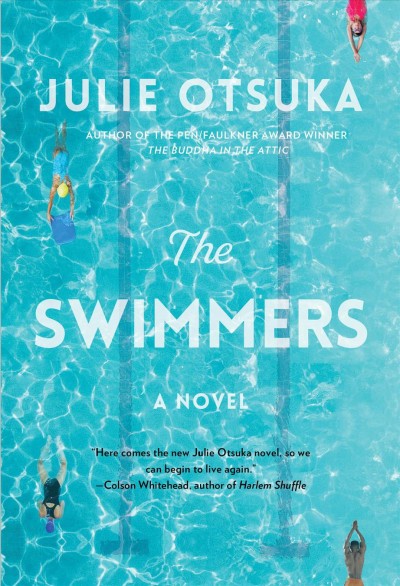 Julie Otsuka’s new book, The Swimmers, is a little bit of a puzzle. It is beautifully written, and heartbreaking in its clarity. Is it a novel? Is it essays? Is it a collection of three novellas? Maybe it does not matter what it is, but it is a little jarring when the first “novella” or essay ends and the story changes direction.
Julie Otsuka’s new book, The Swimmers, is a little bit of a puzzle. It is beautifully written, and heartbreaking in its clarity. Is it a novel? Is it essays? Is it a collection of three novellas? Maybe it does not matter what it is, but it is a little jarring when the first “novella” or essay ends and the story changes direction.
The first section of the book is about an underground swimming pool, and the group of swimmers who show up to swim daily. These swimmers make up the plural first-person narration for this part of the book. The swimmers do not interact with each other outside of the pool, or “above ground;” their familiarity is through the pool and they know each other by the lanes in which they swim and their favorite strokes. When their paths happen to cross above ground, they are uncomfortably caught off guard. While in the pool, however, they look out for each other, even when annoyed by the others’ idiosyncrasies. One swimmer that everyone keeps an eye on is Alice, who is in the early stages of dementia.
One day, a very small, thin crack appears at the bottom of the pool, and the swimmers’ lives are similarly fractured. At first, it seems like the crack is harmless, and easily repaired. This is not the case, however, and after much investigation, testing, and hypothesizing, the cause for the crack cannot be determined. The swimmers are distracted by the crack, and find that they are consumed by thoughts of the crack even when they are not at the pool. The pool is eventually closed for safety concerns, and the swimmers each deal with the closure in their own way. The one swimmer who is most affected by this is Alice, because the daily swimming was a reassuring consistency for her as her dementia progresses.
Here is where the book shifts gears and is no longer about the pool, but focuses on Alice’s life above ground. The plural narrator is now the staff at the senior care home where Alice has moved. We gain a sense of Alice’s lost freedoms, loneliness and confusion as the rules and guidelines for living at the home are explained in a straightforward and blunt narrative. As the reader learns more about Alice and her experiences in a Japanese internment camp, Alice as a young woman dealing with the heartbreak of miscarriages, it is clear Alice becomes less of a singular person to the senior home staff. Through Alice, Otsuka perfectly expresses Alice’s fear, her loneliness, and her sense of being imprisoned when she wants to be at home; the dehumanization of becoming old.
The last section of the book is written in the second person, addressing Alice’s grown daughter. We learn about this daughter’s relationship with her mom, and her own questions about why they were not closer. The guilt, and grief, are expressed simply through writing that spirals back through recurring ideas and patterns. In some ways, the writing mirrors the reflective and repetitive ideas that Alice is trying to grasp as her mind deteriorates. By this time in the story, the pool is hardly mentioned at all, but the crack in the foundation of the pool lingers as a symbol for the fissures in Alice’s life: the synapses misfiring due to dementia, and the fractures in Alice’s relationships with her daughter and husband.
This book is beautifully written, and deeply sad. Other than the slightly disjointed chapters, or essays, it is engaging and thought-provoking; I highly recommend it.


